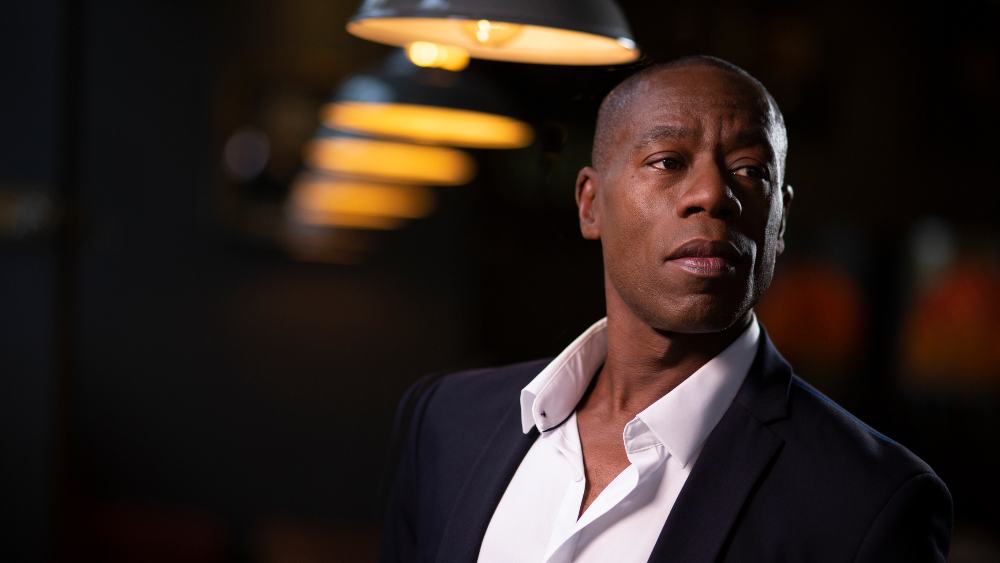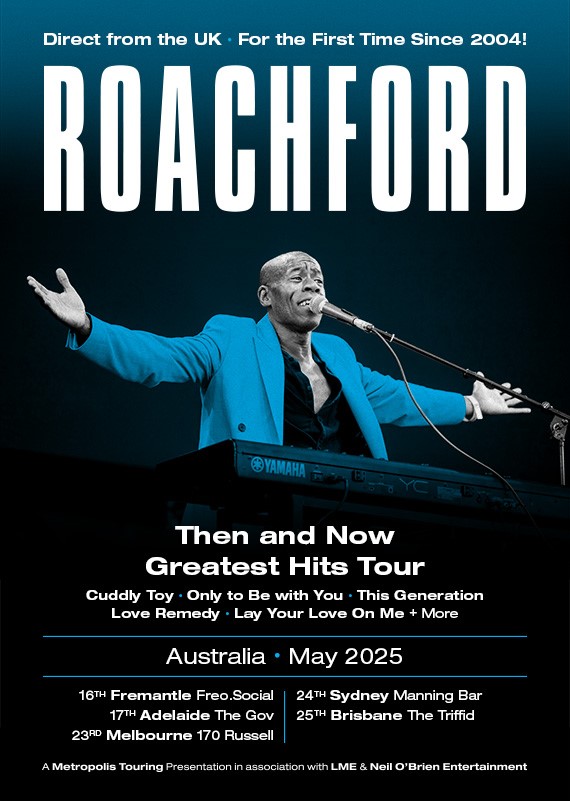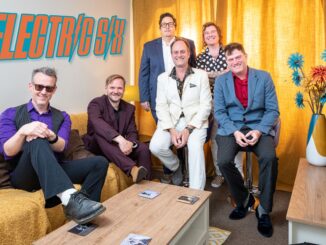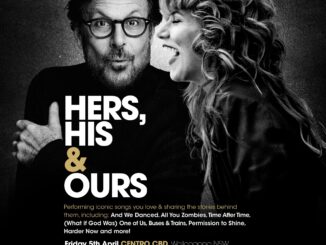
Andrew Roachford or better known as simply Roachford dominated the Australian airwaves and charts in 1994. His third album “Permanent Shade Of Blue” went to number two and was certified two times platinum here in Australia. I got to sit down and have a chat with Roachford ahead of his return to Australia which has been three decades overdue.
If you think that Roachford were one album wonders band; think again he released six studio albums through CBS/Columbia/Sony along with a greatest hits package. In the new millennium Roachford has proceeded to seven studio albums through various labels before returning to a major label this year releasing “Then And Now”.
We go right back to Roachford’s beginnings through to now. We discuss everything in between. This must be one of my favourite interviews of the year. Andrew Roachford is a gem of a human, humble, open and an interviewers dream.
Andrew : Hello, Andrew.
Roachford : Hola.
Andrew : Hey, how are you?
Roachford : I’m good. How are you doing?
Andrew : I’m really well. Thanks for your time tonight and Welcome to The Rockpit, Australia. It’s a great honour to be chatting with you.
Roachford : Likewise, mate, likewise.
Andrew : Obviously the big news and the reason for our chat today is that you’re finally coming back to Australia for the first time since 2004 for a series of shows in May next year. The tour also includes two shows in New Zealand who you haven’t visited since 1995. There’s some serious time to be made up for in all of that. What’s been the reason for the delay?
Roachford : There are a bunch of reasons. The obvious one is that I wish I had the power to move these places closer to each other, you know (laughs), but I guess it’s also finding the right agent and promoter that it’s going to make it worthwhile for everyone. To actually make that long schlep. I’ve been really doing a lot of stuff around Europe and around the UK, but we were always intending to come back to Australia and New Zealand at some point; I wish it didn’t take so long, but that’s life you know?
Andrew : It’s certainly a reason for celebration for us here in Australia and we’re grateful that you’re coming out. I’d like to go back and talk about you from the beginning; you started your career in music at quite an early age. You come from quite a generationally big musical family. Tell me a little bit about your upbringing.
Roachford : Well, my upbringing was the kind of upbringing where basically as a kid, you go into the living room and there’s musicians always in there practicing and rehearsing. On my mother’s side, which is the Rochford side of my family we are generations deep. My grandmother always insisted that everyone had to learn to play the piano. You didn’t even have a choice about that. I had uncles in different bands, my dad was a musician too, he was then instructed to learn an instrument before he was with my mom and a part of her family. So, he started playing drums in my uncle’s band. I was just like surrounded by music constantly, and it was jazz; it was a Caribbean family, so it was Caribbean music, calypso, reggae, whatever, and also a lot of 70s and 60s staxi soul music which my mates at school weren’t exposed to in the way I was, because obviously when you’re at school, when you’re in your young, early teens, it’s all about the music of the time and I was a bit of an anomaly because I was listening to music from all times, you know, I developed a mad eclectic, sense of music from an early age.
Andrew : Now was piano your first choice of instrument? Was there a particular instrument that you wanted to play or was the piano sort of the gateway and you just ran with it? Was it like, my god this is my instrument?
Roachford : Yeah, I think the obvious thing is because there was a piano in the living room where I was living with my family. One day, for some reason, when I was turning four, I just walked down the steps at a ridiculous hour in the morning and started banging away on the piano and woke everyone up. It was at that point that my mum said, either we get him piano lessons or I might kill him (laughs). So, there’s a choice. I mean, I really was terrible, and it was obviously a terrible sound to the household, but for me, it was the most beautiful sound. When I was playing the piano, it was almost like I was going through an out of the body experience; and, yeah, it felt like I found my calling that early in my life.
Andrew : Who or what outside of your family was your biggest and earliest musical influence?
Roachford : Outside of my family? I mean, it was family’s record collection that really started to inspire and influence me because that was exposed to. It was what they were playing, the records they were playing. It was a lot of early soul music. Through that, I discovered Stevie Wonder quite early, The Jackson 5 because they were on the TV when I was a kid. So, I got into the Motown thing, but also growing up in London at that time, there was Radio One, there was a lot of the pop music of the time that just seeps into your subconscious. You don’t even know it’s happening, but it’s influencing you one way or another. A lot of the stuff that was around on the radio at that point would have been Queen, for example. It would have been a lot of like seventies rock bands as well and pop music.
Andrew : It has to be a bit of a trip in some ways to say that an institution like Radio One was so influential and years later you’re actually hearing yourself on Radio One. How does that feel?
Roachford : Surreal. The first time, you know, I wouldn’t say it’s like losing your virginity, but you know, the first time you hear your song on the radio you never ever forget it. I don’t think any artist can say that they’ll forget that because it’s very poignant. I remember I was with my band and we were in a van, a little transit van driving up and down the motorway and turn on the radio and there it was ‘Family Man’, which is the first song I ever released playing and the DJ was saying nice things about it and I just thought, wow, at this moment in time, this is going out live. Millions of people are hearing this song at this moment in time. It’s so surreal (laughs).
Andrew : 1988 was the breakthrough year for you. The debut album, which featured ‘Family Man’ was the starting point for your success which continued to build in the UK. It took Australia six years to catch on to Roachford, and when we caught on, we certainly latched onto your music. In 1994 “Permanent Shade Of Blue” was released. I was working in music retail at the time and I remember the album coming out, I may have even been given an advance copy of the album and I remember the first time I put it in the CD player, I just went, oh my god, there is something special, soulful and magical about this record. There was just a magic about that album. The singles ‘Only To Be With You’ and ‘Lay Your Love On Me’ were all over radio in this country. What do you recall about being told the singles and album taking off in Australia, this remote island at the bottom of the world had embraced you.
Roachford : Oh, yeah, it was great times, I remember because we went to do a promo tour before the album was released, I was coming from England where in the UK and Europe I was doing really well, and when I got to Australia, no one really knew who I was. We were going to all these radio stations and some of them were reluctant to interview me and everything. I loved Australia, but it was a bit of a slog to kind of convince people that you’re, you’re worthwhile and you’re worth interviewing. Aside from being virtually unknown It was great. We went back to England and within six months, “Permanent Shade of Blue” was released, and everyone was like, you need to come back to Australia, and I came back. You know, Madonna had an album out at that time and I think and our album had charted higher than hers and it was all a bit surreal but amazing to come back and everyone had really listened to the album and were loving it. ‘Lay Your Love On Me’, ‘Only To Be With You’, ‘This Generation’, everyone was really had absorbed it and that was a great time, they were great times.
Andrew : With the success of the ‘Permanent Shade Of Blue’ like a lot people, heck I think we all went back and we discovered that first album. For you it’s just been a constant journey and you’ve been so prolific. You’ve released new music every three to four years, almost like clockwork. There has always been something new not too far. You’ve never gone away or had to have comeback tours and that’s what I really love about you and your music. Touching on that, there is a period of time where I can’t seem to track down anything from you and I’m going to have to really deep dive. There are four albums from 2011 to 2016 on the M3 label, they’re not on any of the streaming platforms. Can you tell me what the backstory with that is?
Roachford : At that time we were actually doing everything in house and it was a learning curve. And when I say we, it was me and my brother, who sadly has passed now, but we were in a readjustment period because I’d left Sony, and it was quite a challenge to do things the way we were. We were learning and evolving on the other side of the business. We were learning about what’s the best way to put out work and music independently. We were using different distributors and in the long term it made it difficult when it came to certain formats and getting that material back. I’d like to do a lot of re-releases on some of that stuff just so that there is more global accessibility to it.
Andrew : That was, that was the next question because I’m curious about those years. I’ve heard everything either side of that period. The one thing that I will say is that you’ve always been quite innovative, and you’ve also taken a dash of influences of what’s been going on at the time too. You’ve changed and evolved yourself. How important is it to experiment within your own style.
Roachford : You know what, it’s one of those things that I don’t even do consciously. I don’t think I have to do it, or I don’t have to do it. I think as an artist, if you’re living in the present, which I am, you’re going to be influenced, you’re going to hear something every now and again that’s new and you go, wow, that’s interesting. Even just with having that effect on you, it’s now become a layer to what you do, whether you know or not. That’s how music has always influenced me over the years. I just hear stuff, and it blows me away. Then you store that energy and then it influences your production or you in some way. I don’t seek to do that, but I do think that an artist should live in the present. You should be able to follow the artist’s career and feel the changes of time through the years. I’m one of those artists.
Andrew : Throughout the years you’ve also been in demand to collaborate with. Aside from, from the catalogue that we know of yours, what songs would people be surprised to know that you had a hand in writing?
Roachford : Oh, that’s a good question. Over the years I’ve done some co-writing. I haven’t focused on it a lot because I’ve always been focusing on my performance and my career. One of the biggest shocks for me was, I did a song on my “Feel” album called ‘Naked Without You’ and it got covered by Joe Cocker of all people. I remember just listening to it on YouTube and going, wow, I didn’t see that coming (laughs). I certainly didn’t expect that to have happened, then I heard that he’s a massive fan. It just goes to show you just never know who’s checking you out. I haven’t done a lot of big co-writes with people, but when I went to Australia, I did a few writing sessions. One of them was with Jimmy Barnes in Australia. We did a song together called ‘Attention’ (from the album “Double Happiness”), which I love. I’ve done a few, collaborations with writers in Australia that have done really well. So yeah, I’m just happy to write, man, just happy to write.
Andrew : What I have learned from so many musicians is that inspiration hits at the most unexpected times. Do you find yourself with a melody in your head, a lyric or something like that at the strangest of times? Would you consider yourself to be a prolific writer and do you have an extensive catalogue of ideas stored away, or do you tend to write more in the now?
Roachford : I do have millions of ideas. I mean literally millions of ideas. Say I’ve got a great idea for melody and it’s come to me at like 3am in the morning and I can’t be arsed to get out of bed, I will just hum it into my phone, into my little phone recorder, and then get to it later. I have gigs and gigs of me humming into my phone, loads of melodies, and I don’t think I would ever get through them in a lifetime. That’s the truth, you know. I’ve got song ideas here, song ideas there. I remember hearing about Prince having loads of songs in vaults and I think there’s always a reason why you haven’t released them, because there’s something that’s not quite right, you just know when the time is right for them or when they’re ready, so, I just leave them there until maybe one day I listen to one of the songs and I’ll find the missing piece and, and I don’t rush it.
As far as if I’m prolific or not, I’m not sure, it’s relative, isn’t it? I mean, what is prolific? I think I’m very blessed that I get ideas all the time. If someone plays me a couple of chords, I can instantly come up with a melody. Music flows through me, but then lyrically it’s a bit harder because I don’t always feel as impassioned every day about saying something. Most of the music that I come up with is very passionate and it demands an equally passionate lyric.
Andrew : That kind of leads into my next question. For you what’s more important, the lyric, the groove, the melody or the hook?
Roachford : They’re all important, but I will say this; there’s certain things that you can say through music and melody that words cannot touch. It’s a language that’s beyond words and you can communicate that universally. I actually remember my cousin having this cat and I used to play on the piano and every time I played the cat would come and sit on the piano stool next to me and it was definitely listening (laughs) and if I played like a little discordant not so nice sounding notes you could see the cat kind of wincing (laughs) and I was just like yeah, music literally is universal. You can communicate a feeling and a message with music beyond words so that’s the answer to your question.
Andrew : If we can touch on the latest album, “Then and Now”, which is a collection of new songs and re workings/revisions of some of your work. The three new songs, ‘Wonder Woman’, ‘All the Love We Need’, and ‘Almost There’ feel so seamless in the way that they present themselves on the album, everything flows together nicely. How was it coming back twenty or thirty years on and revisiting a lot of those songs for this album?
Roachford : You know what, that’s a very good question. When the idea of reworking and re-recording, some material was suggested I was like, yeah, we need to do it, the time felt right to revisit and maybe do a now perspective of the then songs, so to speak. I was in the studio listening to myself, because I don’t really listen to a lot of my old songs. I don’t sit there listening to me all the time, but by listening it became clear that I am a different character; I’m a different person, I am the same person, but there’s a whole journey that I’ve lived since I recorded and wrote those songs. Even as a singer I could hear myself and I go, Oh yeah, I’m different now. My voice has changed, it’s a bit deeper, I’d say, and richer. So, I had to sort of find that place where I still honoured what I was doing then. But brought the new me, to the old songs. It was great because it was like looking at a whole album of photo’s you know, snaps of your past. It brought back so many memories. Music can evoke that and listening to those songs again I was transported back in time. It was amazing.
Andrew : On the “Then and Now” album, there is a song called ‘Better’, which came from 2020 is “Twice In A Lifetime”, for a song that’s still quite new what was the motivation behind re-recording that one?
Roachford : Better, I think it’s one of those songs that I felt like it needed more attention, you know, I feel like more people needed to hear it because I’m really proud of that song and I feel like the message of the song is very relevant to where we’re at now. I feel that we’re going into a bit of a place now, and when I say we, I mean globally, I mean humanity, you know, we’re going through a bit of a rough patch. We are all finding our way and any opportunity to remind ourselves of the fundamental things that matter in life is important, and that song, sort of looks at that, you know?
Andrew : There is a cover on “Then And Now” which is Stevie Wonder’s ‘Someday at Christmas’. You’ve mentioned a fondness for Stevie Wonder, what made you choose that song to cover?
Roachford : I think that the whole fact that I did do some Christmas shows, I did a Palladium gig and a few others, we had to think of which songs to put into the set, and that one came up and I’d never really probably listened to ‘Someday at Christmas’ by Stevie Wonder. When I did, I found that there are more layers to it; it’s not just a chintzy Christmas song. It’s actually an anti-war song. It’s a love song in this sort of global sense. There really is a lot more to it than you initially might think. So, I recorded it, and people were really liking it, they were like, oh, I love your version of it. My management was saying you should definitely put it out at some point, and there was an opportunity to put it on the album. When we were putting this album together, we were thinking what can we put on the album to bring different sides of what I do and that was just one thing that got thrown into the pot.
Andrew : Great choice. Love, love the song. Love it. Love it.
Roachford : Thanks. Great song. I mean, Stevie is just, don’t get me started on Stevie Wonder (laughs).
Andrew : I know we are running short on time, but there are a few questions that I just wanted to ask you. What can we expect from the tour? Will it be reflective of the “Then And Now” album, as well as some, some deeper stuff. Will we hear some of the songs from 2011 through to 2016 thrown in as deep dives?
Roachford : Well, you know, I haven’t been back to Australia for so long and there’s so much I want to do to sort of fill in the blanks of the story so far. Obviously, you’ve only got an hour and a half to two hours to do it in. I’m trying to consolidate and work out what songs to include and what songs to leave out. Of course, I have to do the songs that did so well for me in Australia from the “Permanent Shade of Blue” album. I want to play some songs from the “Feel” album. I also want to introduce people into present day what I’m doing now. There will be a couple of nods to the then and now, and we’ll do a couple of tracks from that. I’ll be picking a few from the albums that didn’t get released in Australia. A big part of it will be, you know, the ‘Permanent Shade Of Blue’ songs like ‘This Generation’, ‘Only To Be With, ‘Lay Your Love On Me’ and maybe ‘Ride the Storm’.
I haven’t put the set completely together but it’s going to be good because I’ve got a lot to choose from. The main thing about my shows is, it’s not even about what songs you do, it’s about the energy and how they’re done. It’s the energy about the performance and how the audience connects. My shows are about being interactive. They’re interactive in that way it’s not just like, I’m on stage, look at me doing my thing. It’s an event where everyone is involved.
Andrew : There is another question that ties into that and I’m glad you sort of segued me. When playing live, I know people that are passionate performers, and they really don’t care whether they’re playing to five people or to a hundred thousand people. What excites you most as a performer? Is a bigger crowd a better crowd live?
Roachford : Wow, that’s a good question again. I’m not sure that a bigger crowd isn’t just more pleasing just because of your ego (laughs), you know in reality what is important to me is that the crowd is connected, and there’s an emotional feeling in the audience. Obviously, you know, you’re walking out and doing an arena gig and you’re seeing all those people, and they know your songs. It’s flattering, you know, but then sometimes I’ve played in really small clubs. I played in The Basement in Sydney and it’s a night that you never forget. You do that and that’s a moment in time that you never forget.
There’s an album by Otis Redding that I love. It’s a live album. Otis at the Whiskey A Go Go. I think it was recorded in the sixties, and you can hear it’s a small room. It’s an intimate thing, you can hear the audience, and you can feel their energy on the stage. I love that and that’s what I really do love to do you know.
Andrew : It’s always interesting to get that perspective from an artist too. We are really pushing time. I think I’ve probably prepared three hours’ worth of questions for you here. I do apologize for that, but it’s been amazing talking to you, and I’d really like to thank you for your time again. Thank you for returning to Australia I’m so excited to see you out here in May.
Roachford : And I look forward to coming out. It’s going to be a blast. It’s going to be amazing. And thank you for doing this interview. I’ll hopefully see you at the show.
Andrew : Absolutely, I will be there.
Roachford : All right. Take care Andrew




